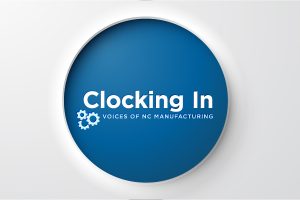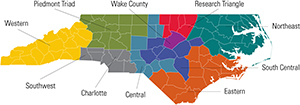In March, WRAL reported that Raleigh ranks first nationally in job growth related to STEM (science, technology, engineering and math) skills. These new STEM jobs are highly paid and highly secure—people with STEM jobs enjoy salaries about 26 percent higher than their non-STEM colleagues, and are less vulnerable to job loss because their skills are in high demand.
Yet, the National Commission on Mathematics and Science for the Twenty-first Century has projected that 60 percent of the newest jobs will require skills possessed by only 20 percent of the current workforce. In the US, and even in STEM-savvy NC, the skilled worker shortage is approaching a crisis point.
Why aren’t we producing enough STEM-trained professionals, and what can we do to counter the trend?
In May, Business North Carolina hosted a roundtable highlighting the important role that K-12 and higher education plays in meeting the critical need for qualified talent in STEM industries like advanced manufacturing and biotech. I was a participant in the roundtable, joining my colleagues in government and private industry to discuss how together we can boost interest and competence in STEM and keep our state competitive in the coming years.
One point that we kept returning to during our discussion is the real need for us to rethink equating STEM skills with science degrees. Today’s high-tech jobs do require proficiency in the hard sciences like engineering and chemistry, but they also equally require critical thinking and the ability and confidence to approach and solve complex problems.
NC State University recognizes that the best way to teach these skills to tomorrow’s information technologists and mechanical engineers is to to feed their curiosity now. From intensive summer laboratories and camps, to guided tours of state-of-the-art research facilities, we offer myriad opportunities for students, teachers and parents that are designed to spread a “Think and Do” philosophy– see them all at MISO (Maximizing the Impact of STEM Outreach).
We can’t forget the employers in this equation, either. Businesses must be at the top of their game if they are to allow a new generation of workers to realize their full potential. Resources like NC State University Industrial Extension Service helps businesses in North Carolina lead, improve, grow, and connect to meet this goal.
The bottom line is, we don’t need to force North Carolina’s successful businesses to look elsewhere for workers to meet their needs. We have the vision and the capability to grow our talent here at home, ensuring prosperity for industry and STEM workers alike.
Interested in joining the conversation? Tweet us at @NCStateIES.
—

Dr. Terri Helmlinger Ratcliff is the Vice Provost for Outreach and Engagement at North Carolina State University and Executive Director of the NC State IES. She holds a bachelor’s degree in engineering from N.C. State, earned an M.B.A. from Duke University as a Fuqua Scholar and her Ph.D. is in public administration, also from N.C. State.



